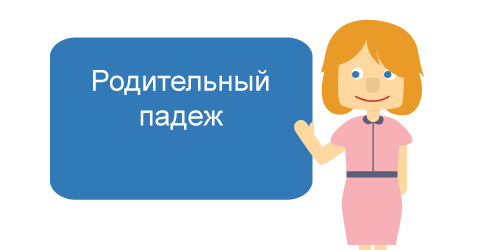
Russian cases
Free course to learn all Russian cases
Lesson 4:
Genitive - Part 1
The genitive case of nouns
!! This course requires basic knowledge of Russian. If this is not your case, we recommend you our Basic Russian Course.

Introduction to the genitive case
When is the genitive case used?
Generally, we use the genitive case...
- to express ownership: Это стол моего брата - This is my brother's table.
- in many cases where we use "of" in English: Э́то стака́н воды́ - This is glass of water.
- to express ownership with the construction у + genitive + есть: У моего́ дру́га есть стол - My friend has a table.
- to express absence of an object/person: Здесь моего́ бра́та нет - My brother is not here.
What will we learn in this lesson?
We are going to learn the genitive case of different nouns and pronouns.

Russian vocabulary
Read, listen and repeat the vocabulary of this lesson:
If you still don't know how to read the Cyrillic alphabet, visit our course on how to read Russian.
роди́тельный паде́ж
genitive (Gen.)
маши́на
car
рестора́н
restaurant
выходи́ть
to leave / to go out
молоко́
milk
стака́н
glass
са́хар
sugar
Москва́
Moscow
культу́ра
culture
теа́тр / музе́й
theatre / museum
мно́го / ма́ло + gen.
many / little + gen.
далеко́ от + gen.
far from + gen.
о́коло / у + gen.
near / by + gen.
без + gen.
without + gen.

Dialogues in Russian
Read, listen and pay attention to the cases used
Extra help: highlighted cases + tables
We have highlighted the words in genitive. You can also look up these grammar tables while you read the dialogues:
These tables will open in a new window
Dialogue 1
Я сего́дня поняла́, что у меня́ ничего́ нет!
Today I understood that I have nothing! (lit. "I don't have nothing")
Ты не права́! У тебя́ есть хоро́ший дом.
You aren't right! You have a nice house.
Э́то дом моего́ отца́. У меня́ нет до́ма...
That house is my father's. I don't have a house...
Но у тебя́ есть маши́на!
But you have a car!
Э́то маши́на мое́й сестры́. У меня́ нет маши́ны...
That car is my sister's. I don't have a car...
Но у тебя́ есть друг!
But you have a boyfriend!
Уже́ нет... Сейча́с э́то друг мое́й подру́ги. Поэ́тому у меня́ подру́ги то́же нет.
Not anymore... Now this is my friend's boyfriend. That's why I don't have a friend either.
Dialogue 2
Майкл, где ты? Я жду тебя́ о́коло рестора́на.
Michael, where are you? I'm waiting for you near the restaurant.
Я выхожу́ из до́ма...
I'm leaving from home...
Ты то́лько выхо́дишь из до́ма?! Я жду у рестора́на уже́ де́сять мину́т!
You are just leaving (from) home?! I'm waiting by the restaurant already ten minutes!
Извини́...
Sorry...
Ла́дно. Что для тебя́?
Alright. What (do you want) for you?
Ко́фе без молока́.
Coffee without milk.
Хорошо́... пока́
Ok... see you.
Что для вас?
What (would you like) for you?
Здра́вствуйте, стака́н со́ка, пожа́луйста.
Hello, a glass of juice, please.
Извини́те, у нас нет со́ка. У нас есть чай.
Sorry, we don't have juice. We have tea.
Хорошо́, чай без са́хара.
Fine, tea without sugar.
Чай без са́хара. Э́то всё?
Tea without sugar. Is that all?
Нет, ещё ко́фе без молока́ для моего́ дру́га.
No, also coffee without milk for my friend.
Dialogue 3
Тебе́ нра́вится Москва́?
Do you like Moscow?
Коне́чно нет! Там сли́шком мно́го люде́й, сли́шком мно́го маши́н и домо́в.
Of course not! There are too many people, and too many cars and houses.
А я люблю́ Москву́. Там мно́го культу́ры, мно́го теа́тров.
And I love Moscow. There is a lot of culture and many theatres.
У люде́й о́чень ма́ло вре́мени. Там всё так далеко́ от до́ма!
People have too little time. There everything is so far from home!
Коне́чно, э́то большо́й го́род, но о́чень краси́вый! Там мно́го музе́ев. Я не могу́ без Москвы́.
Of course, this is big city, but very beautiful! There are many museums. I can't (live) without Moscow.
Do you want to learn Russian with the best courses and books?
We recommend you the best Russian course, with 160 videos and personal tutor.
If you love reading, have a look at these books with stories in easy Russian with audio.
If you want to practice your Russian, here you can find exercise books, with key and grammar tables.

Russian grammar
Read the following grammar summary. We will learn the cases from this lesson.
The genitive Case: Nouns
In the dialogues we have seen examples of Genitive Case (Gen.) in nouns. Below we will learn more about it
Nouns in singular
We have highlighted the endings in the tables for each gender.
Masculine: -а -я>
- Э́то мой стол (Nom.). Моего́ стола тут нет (Gen.).
This is my table. My table is not here.
Feminine: -ы -и
- Э́то моя́ кни́га (Nom.). Мое́й кни́ги тут нет (Gen.)
This is my book. My book is not here.
Neuter: -а -я -мени
- Э́то моё окно (Nom). Моего́ окна́ тут нет (Gen.).
This is my window. My window is not here.
Nouns in plural
We have highlighted the endings in the tables for each gender.
Masculine: -ов -ев -ей
- Э́то мои́ столы́ (Nom). Мои́х столо́в тут нет (Gen).
These are my tables. My tables are not here.
Feminine: -... -ь -ий -ей
- Э́то мои́ кни́ги (Nom.). Мои́х книг тут нет (Gen.).
These are my books. My books are not here.
Neuter: -... -ей -ий
- Э́то мои́ о́кна (Nom). Мои́х о́кон тут нет (Gen.).
These are my windows. My windows are not here (the word окна has an irregular genitive plural).
Compare
у меня́ + nominative = I have...
у меня́ нет + genitive = I don't have...
- У меня́ есть кни́га = I have a book / У меня́ нет кни́ги = I don't have any book
- У тебя́ есть столы́ = you have tables / У тебя́ нет столо́в = You don't have tables
Also, remember that the expression "I have / you have / etc." is formed with "у + genitive" (for example, "меня́" is the genitive of "я")

Test
Check how much you have learnt in this lesson:
This Russian course will always be free. Please, share it
When you share our website, you're helping us continue with our project: developing free Russian courses for everyone. Please, invest some seconds of your time in sharing us. Thank you.
|
Contact us Site map Terms of use Privacy policy Shop - Russian school Copyright © www.russianforfree.com All rights reserved. |


